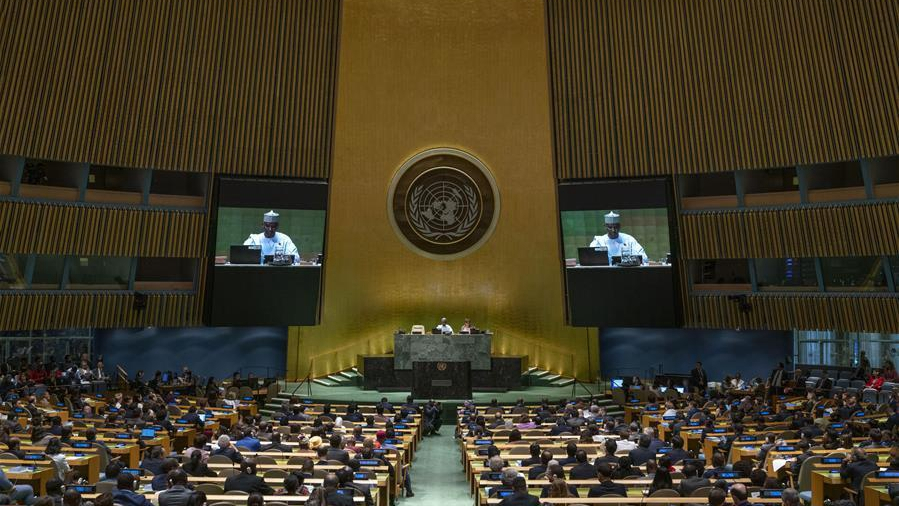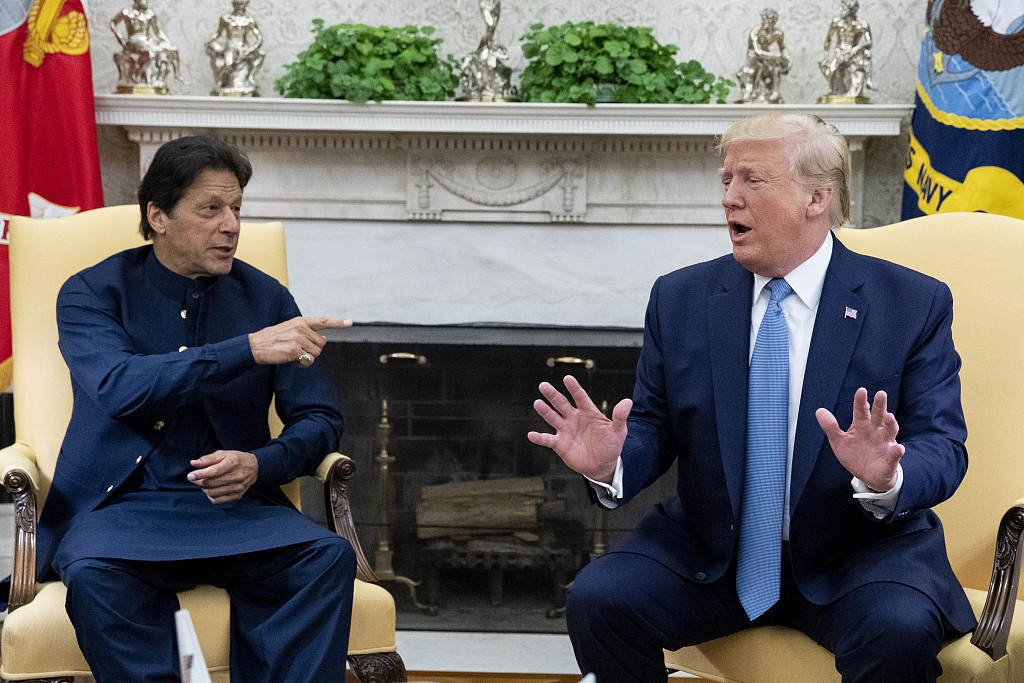
Editor's note: Sultan Mehmood Hali is a veteran of the Pakistan Air Force and television host with PTV News. The article reflects the author's opinion and not necessarily the views of CGTN.
Pakistan's Prime Minister Imran Khan has set course for U.S. to address the 74th Session of the United Nations General Assembly (UNGA). En route, he is visiting Saudi Arabia on September 19-20, where he will discuss not only the various dimensions of the grave situation in Indian-controlled Jammu and Kashmir, but also war in Yemen following the drone attack on oil facilities in the kingdom.
The situations has changed drastically since Khan's July 22 visit to the U.S. and his meeting with U.S. President Donald Trump who offered mediation between the two protagonists on the Kashmir issue.
Not only did India turn down Trump's offer, but on August 5 abrogated Article 35A and amended Article 370 of its Constitution, annexing Indian-administered Kashmir and Ladakh into its Union territory. Indian Kashmir has been in a state of lockdown since then, while tension has mounted between Pakistan and India with the threat of war looming.
Pakistan has gone from pillar to post seeking support from the international community to bring diplomatic pressure on India to reverse its unilateral decision on Kashmir. Unfortunately, apart from China, Pakistan's all-weather friend, and to some extent Turkey, no other country has extended diplomatic support to Pakistan's condemnation of the Indian action in Kashmir, not even the Islamic community because of its deep trade ties with India.
A lot of hype has been created in the domestic as well as international media regarding the expected clash of words because both Khan and his Indian counterpart Narendra Modi are scheduled to address the UNGA on the same day.
In this backdrop, it is not Khan's address at the UNGA, which will be in the spotlight but the side events, which will have a direct bearing on whether peace can be restored in the region. Khan is scheduled to meet President Trump on September 23, where he is likely to reiterate the resumption of dialogue between the Afghan Taliban and the U.S. besides briefing him on Pakistan's views on Kashmir.
Trump, on the other hand, is not only meeting Modi on the sidelines, but has also promised to join Modi's rally in Houston in front of tens of thousands of people on September 22.
For the Indian government, Trump's presence at the rally is being touted as a diplomatic triumph in the near past, the U.S. and India have engaged in a trade war where Trump has accused India of preposterous trade tariffs; yet the personal rapport between Trump and Modi prevails.
Khan too apparently had made a good impression during his maiden sojourn to Washington D.C. as prime minister two months earlier, but he will have to pull a rabbit out of the hat, if results are to be achieved to alleviate the sufferings of the Kashmiris.

U.S. President Donald J. Trump (R) and Prime Minister of Pakistan Imran Khan meet press in the Oval Office of the White House in Washington, D.C., July 22, 2019. /VCG Photo
U.S. President Donald J. Trump (R) and Prime Minister of Pakistan Imran Khan meet press in the Oval Office of the White House in Washington, D.C., July 22, 2019. /VCG Photo
President Trump's recent comments that "a lot of progress" has been made in defusing tensions between the two South Asian states has strengthened the assumption that his meetings with the Indian and Pakistani leaders will bear fruit. U.S. lawmakers have also nudged Trump to use the UNGA session as an opportunity to play the role of peacemaker between India and Pakistan.
Contrarily, Indian obduracy and harsh statements on the changed status of Kashmir and Ladakh as well Khan's actions like denying the Indian President Ram Nath Kovind to use Pakistani airspace for his flight to Iceland earlier in September do not help matters.
On September 18, Pakistan denied India's request for Modi to use Pakistani airspace for his flight to Germany. Such diplomatic posturing may be welcomed domestically but in the international arena, it can spell trouble because India can appeal to the International Civil Aviation Organization (ICAO) which may impose fines on Pakistan. Perhaps Khan wants to bring about pressure on his Indian counterpart, whom he considers intransigent.
On the Afghan front, Pakistan has been making serious efforts to bring stability. It had nudged the Taliban to hold direct talks with the U.S. and on the eve of the supposed historic breakthrough, the mercurial Trump cancelled the finalization of the peace agreement at Camp David (kept secret till then) much to Pakistan's dismay.
On September 7, Foreign Ministers of Pakistan, Afghanistan, and China held the 3rd Session of China-Afghanistan-Pakistan Foreign Ministers' Dialogue, in Islamabad. On the eve of his departure for New York via Riyadh, Imran Khan symbolically inaugurated the Integrated Transit Trade Management System at the Pak-Afghan border at Torkham, one of the major border crossings with Afghanistan, enabling round-the-clock trade and immigration facilities at the border crossing.
Normalcy in both Afghanistan and Kashmir are highly desirable for peace in the region and the fruition of economic projects, but it would be unrealistic to expect spectacular results. We have to wait and see if Khan's eloquence and charisma can swing world opinion in favor of peace.
(Cover Image: The opening of the 74th session of the United Nations General Assembly at the UN headquarters in New York, September 17, 2019. /Xinhua Photo)
(If you want to contribute and have specific expertise, please contact us at opinions@cgtn.com.)